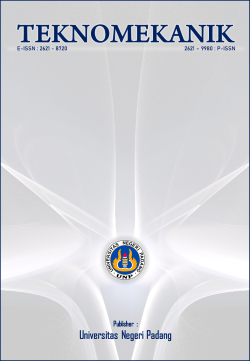The influence of further study information services on the interest of enterprising students of SMK Negeri 2 Mataram
DOI:
https://doi.org/10.24036/jptk.v3i4.15023Keywords:
Counseling Guidance, Departments, Vocational Education, Higher EducationAbstract
This study aims to determine whether the guidance of further study information services affects the higher education interest of students of SMKN 2 Mataram. This study uses a quantitative research approach with the Pre-Experimental Design method in the form of One-Group Pretest-Posttest Design. The variables of this research are the interest in entering higher education and the independent variable of further study information service guidance. The study population was SMKN 2 Mataram, while the sample was students of class XI who attended further study information service guidance, namely 36 (thirty) students, who were determined by incidental sampling technique. Based on the results of data analysis with SPSS 17.0 for windows software with the Paired Sampe t Test procedure, the results show that t is greater than t table, t (count) (3.986)> t (table) (1.690). So the hypothesis of this research: there is an effect of further study information services on student interest in learning at SMKN 2 Mataram is accepted. The results of this study prove that information services for further studies have an effect on student interest in entering higher education. Therefore, it can be used as input and material for consideration for Guidance and Counseling Teachers in order to increase their role in directing vocational students who intend to continue to a higher level of education after completing their studies.
Downloads
References
Amalina, Amalina, and Yuliani Dewi Putri. 2018. “Pengembangan Sistem Informasi Berbasis Web Untuk Peningkatan Kinerja Unit Bursa Kerja Khusus SMK Negeri 1 Tanjung Raya.” Khazanah Informatika: Jurnal Ilmu Komputer Dan Informatika 3(2):73.
Ariyanto, Sudirman Rizki, Ikke Wulan Puji Lestari, Savira Uswatun Hasanah, Latifahtur Rahmah, and Devi Vitriana Purwanto. 2020. “Problem Based Learning Dan Argumentation Sebagai Solusi Dalam Meningkatkan Kemampuan Berpikir Kritis Siswa SMK.” Jurnal Kependidikan: Jurnal Hasil Penelitian Dan Kajian Kepustakaan Di Bidang Pendidikan, Pengajaran Dan Pembelajaran 6(2):197.
Bjurulf, Veronica. 2012. “‘You’ll Just Have to Practice until You Find Your Own Way to Do It!’ - A Narrative Study about How Teaching Is Carried out in Technical Vocational Education.” Nordic Studies in Science Education 8(1):17–25.
Creswell, Jhon W. 2014. Research Design: Qualitative, Quantitative and Mixed Methods Approaches (4th Ed.). Thousand Oaks, CA: SAGE.
Creswell, John W. 2012. Educational Research: Planning, Conducting, and Evaluating Quantitative and Qualitative Research. Vol. 4.
Maulyda, M. A., Nurmawanti, I., & Khair, M. S. (2020). Deskripsi Kemampuan Koneksi Matematis Siswa Kelas X Pada Materi Sistem Persamaan Linear Tiga Variabel. SJME (Supremum Journal of Mathematics Education), 4(1), 1–12. https://doi.org/10.35706/sjme.v4i1.2026
Maulyda, M. A., Rahmatih, A. N., Gunawan, G., Hidayati, V. R., & Erfan, M. (2020). Retroactive Thinking Interference of Grade VI Students: A Study on the Topics of PISA Literacy Lessons. Journal of Physics: Conference Series, 1471(1), 1–7. https://doi.org/10.1088/1742-6596/1471/1/012037
Moreno Herrera, Lázaro. 2016. “Vocational Education and Training in New Times - What Is the Best Way Forward?” Nordic Journal of Vocational Education and Training 6(2):66–83.
Nurfazriah, Indah, Deni Kurniadi Sunjaya, and Susi Susanah. 2018. “The Peer Counseling Model in Adolescents Reproductive Health for Senior High School Students.” Global Medical & Health Communication (GMHC) 6(3):234–45.
Rahman, Imas Kania. 2020. “The Development of E-Counseling Gestalt Prophetic to Help Students Cope with Academic Procrastination in Indonesian Islamic Higher Education.” Islamic Guidance and Counseling Journal 3(1):46–53.
Rosmawati, Rosmawati, and Donal Donal. 2017. “Tracer Study of Graduate Students in Guidance and Counseling Program at the Faculty of Education in Universitas Riau.” TERAPUTIK: Jurnal Bimbingan Dan Konseling 1(2):113.
Sánchez de Gallardo, Marhilde, and Ligia Pirela de Faría. 2017. “¿Qué Hacer Con Los Resultados de Las Pruebas Psicológicas de Estudiantes de Educación, Mención Orientación?” Psicodebate 7(3):169.
Siswantari. 2015. “Pengembangan Program Studi Keahlian Pada SMK Sesuai Kegiatan Ekonomi Utama Di Enam Koridor Ekonomi.” Jurnal Pendidikan Dan Kebudayaan 21(2):135.
Sjöberg, David, Staffan Karp, and Oscar Rantatalo. 2019. “What Students Who Perform in ‘Secondary Roles’ Can Learn from Scenario Training in Vocational Education.” International Journal for Research in Vocational Education and Training 6(1):46–67.
Sobrinho, Shauma Tamara Nascimento, and Romier da Paixão Sousa. 2020. “Work and Research in Secondary Education Integrated with Vocational Education: A New Perspective of Rural Development.” Revista Brasileira de Educação Do Campo 3(2):1–19.
Sugiyono. 2016. Metode Penelitian Kuantitatif Kualitatif Dan R&D. Bandung: Alfa Beta.
Sukholentseva, Elena, Irina Gulakova, and Tatyana Goltsova. 2019. “To the Problem of Education of Adolescents at Risk in a Public Association in the Process of Pedagogical Counseling” edited by B. Yazyev. SHS Web of Conferences 72(4):03032.
Trenado, Carlos, Matthias Boschheidgen, Julia Rübenach, Karim N’Diaye, Alfons Schnitzler, Luc Mallet, and Lars Wojtecki. 2018. “Assessment of Metacognition and Reversal Learning in Parkinson’s Disease: Preliminary Results.” Frontiers in Human Neuroscience 12(September):1–9.
Tyson, Ruhi. 2016. “What Would Humboldt Say: A Case of General Bildung in Vocational Education?” International Journal for Research in Vocational Education and Training 3(3):230–49.
Downloads
Published
How to Cite
Issue
Section
License
Copyright (c) 2021 Mohammad Archi Maulyda, Siti Istiningsih, Uwi Martayadi, Anton Budiharjo

This work is licensed under a Creative Commons Attribution 4.0 International License.





